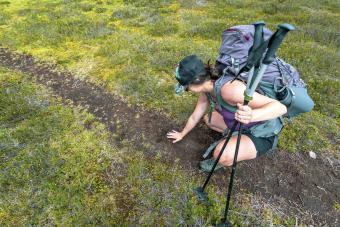
There's something thrilling about seeing wildlife in their natural habitat, and bears are no different with their raw power and fuzzy appearance. However, they can present a serious danger to you and your camping group should you fail to respect their space and take the necessary precautions. With bears calling most of the North American continent home, you won't be free of them completely, but you can follow these bear safety tips to ensure that you live to have another encounter some other day.
Beary Important Tips for Bear Safety

Black and brown bears are found all across the United States and Canada, with certain regions, such as Alaska, the upper mid-west, and the mountain regions on the East Coast. Given that most camping occurs in these regions, it's imperative that you understand the steps that you should take to protect your campground from a bear encounter, as well as what to do should you come across one unexpectedly.
Be Aware of Your Surroundings

It doesn't matter if you're camping at a seasoned campsite or if you're hiking through the backcountry to set up camp in a primitive site. You should always remain constantly aware of your surroundings and be on the lookout for cues that there has been some bear activity. Things such as broken logs or branches and claw marks can be early indicators that there are active bears nearby.
Don't Camp in Bear Country Alone
You're likely to make much more noise when you're with a group than you are when you're by yourself. The average noise that comes from a group of people can indicate to bears that you're humans and not prey animals, encouraging them to stay away from you and your path.
Bring Bear Spray On Every Trip
Bear Repellant sounds like a whacky tool Adam West's Batman would pull out of his brightly colored utility belt; however, it's actually a survival tool to carry with you when you're camping in bear country. According to a former National Park Service research biologist, Tom Smith, not having bear spray is like, "Riding a truck and refus[ing] to wear a seatbelt." In a study he published in 2012, Smith found that there were far fewer deaths and casualties with people who used bear spray in bear encounters than with people who used guns as a deterrent.
Make Camp in a Sensible Location
You're most at risk of a bear encounter when you're backcountry camping due to the dense tree cover, untamed wilderness, and lack of noise pollution to deter bears from your shelter. Keep in mind that the best campsites to keep away from bears are in open areas away from dense foliage. Similarly, try to bring tents that will camouflage into your surroundings, as these are less likely to capture a bear's attention.
Smells - Good or Bad - Are Not Your Friend
Bears are highly attracted to the smell of food, so one of the most imperative, and easiest, ways to guard yourself against a potential bear attack while resting in your campsite is to properly seal your food. Here are some tips for how you can prevent bears from using their nose to ever find your campsite in the first place:
- Secure your food items in airtight containers to keep any smells from wafting out of them.
- Immediately rinse all of your utensils and dispose of your used water downwind of your campsite.
- Hang all food items, used utensils and dishware, and trash at least 10 feet off of the ground and 5 feet away from the tree trunk.
- Don't sleep with aromatics in your tent, and never store these in your tent at any time.
Leave Your Pets at Home
There's nothing like bringing your beloved family pet along for your camping adventures, but you should leave them at home if you're planning on going into bear country. Not only will animals not be able to react appropriately to a bear attack, but you're also putting them at risk of being mauled by the bear. When in doubt, leave your pets at home. But, if you insist on bringing them with you, always keep them leashed and don't let them wander alone into the night.
What to Do During a Bear Encounter

No matter how much time and effort you put into trying to keep a bear encounter from happening, there's a chance that you and a bear will cross paths. If this does happen, it's crucial that you follow professional advice to keep both you and the bear as safe as possible:
- Try not to spook a bear - If you come into contact with a bear, start speaking to it in calm, low tones. Sudden screams or loud shouts can startle the bear into an attack response.
- Make your presence known - Along with speaking to the bear, you want to raise your arms and slowly sidestep away from the bear. This keeps the bear constantly in your vision and communicates to the bear that you're not prey.
- Do not run from the bear - Running away from a bear will trigger their chase response, and bears are deceptively fast creatures.
- Identify what bear you're dealing with - Bears react differently to human encounters and stimuli depending on their species. Thankfully, black and brown bears have a distinctive visual difference, so you'll often be able to tell which one you're dealing with.
- Fight for your life - Playing dead during a bear attack will only work for brown bears, but even then it's no guarantee that you'll make it out alive. Should you need to fight back, use whatever you can to hit the bear's face and muzzle.
Bear All of These Tips in Mind
Do your research before camping in bear country and familiarize yourself with all of the many bear safety tips that are out there. Proper preparation can be the difference between having no bear encounters or having a single, fatal one.







